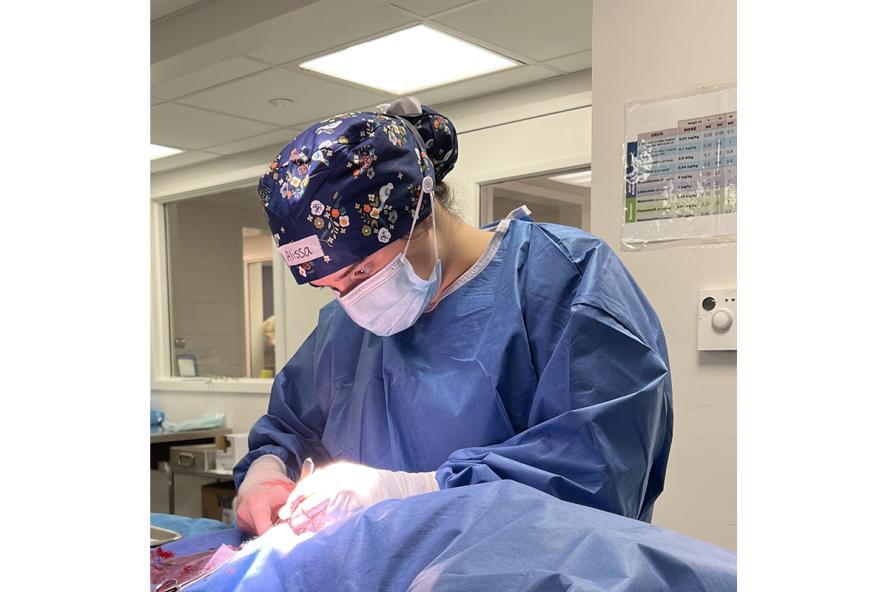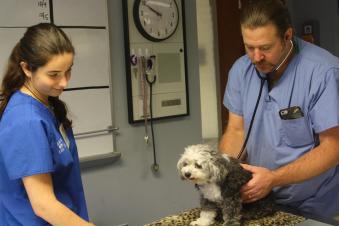The path to Cummings School
As a middle school student, Alissa discovered the veterinary assisting program while attending a WTHS open house. Interested in the veterinary field from a young age, she later found her calling as a student in the program.
“It was a great experience that solidified my idea of going to vet school,” she says. Working in the [Tufts at Tech] clinic and getting involved in community medicine awoke her passion for veterinary medicine. “We provided pet care to clients that otherwise wouldn’t be able to afford it and I love that feeling. It is so fulfilling to see how thankful the clients are.”
Wolfus lauds the influence the students have had on their fellow area residents. “Our high school students are from the same target community as our clients,” he says. “It gives them pride to positively impact their community in such a meaningful way. Tufts at Tech directly improves the lives of over 5,000 animals per year, each of whom has a loving and grateful family.”
As a high school student at Tufts at Tech, Alissa met two supportive mentors in Wolfus and Dr. Jenni Grady, V12, an assistant clinical professor in the Department of Clinical Sciences.
“Dr. Wolfus let me sit in on the vet student rounds because he knew I wanted to go to vet school and we regularly talked about career options and life in general,” Alissa shares. “And Dr. Grady has been a really helpful mentor to me in vet school.”
After graduating from WTHS and earning an approved veterinary assistant certificate, Alissa attended Becker College in Worcester. She completed a B.S. in veterinary/animal health technology and became a certified veterinary technician. During this time, she gained a wide range of veterinary experience. Alissa worked part-time as a vet tech at a local clinic, returned to WTHS for a summer externship, and completed an internship at Cummings School’s Henry and Lois Foster Hospital for Small Animals, as well as an externship at its Hospital for Large Animals. She also volunteered at Luke and Lily Lerner Spay/Neuter Clinic’s feral cat clinics, helping provide preventative care.
For Alissa, pursuing a D.V.M. at Cummings School was a natural progression. “It was always my first choice, because of my connection through Tufts at Tech, the cat clinics, and my other experiences,” she says. “I knew them well, so it was the obvious choice for me, and it was close to home.”
Her Cummings School experience
Alissa’s background and familiarity with Cummings School made her transition a bit easier than most. “I feel like I got a head start from my Worcester Tech, volunteer, and vet tech experiences,” she explains. “I had a foundational knowledge and my vet school education built upon that. And this year, when we started to get into clinics (clinical rotations), I was already comfortable with blood draws and running lab work, which helped a lot.”
The education and experience Alissa received, at Cummings School and through her previous endeavors, has prepared her well, despite some early trepidation. “Going into clinics, I was unsure about myself as a doctor, but over my six months in clinics, I have learned so much and become more comfortable and confident in my abilities.” she says.
Alissa is glad that her final core rotation will occur at Tufts at Tech. “I look forward to being the doctor there,” she explains. “The clinical year is key to putting everything that you learn from your didactic education into practice.”
Looking to continue her work in shelter and community medicine, Alissa is pursuing opportunities in those areas. “I’m focused on community medicine and affordable care, following my Tufts at Tech experience,” she says. “There is a shelter medicine specialty, so that may also be a part of my future.”
According to Wolfus, other students are following Alissa’s lead in veterinary medicine. “I know Alissa is the first of many future veterinarians who were first exposed to the profession at WTHS. The hope is that they will be the next generation of role models to provide community veterinary care.”

